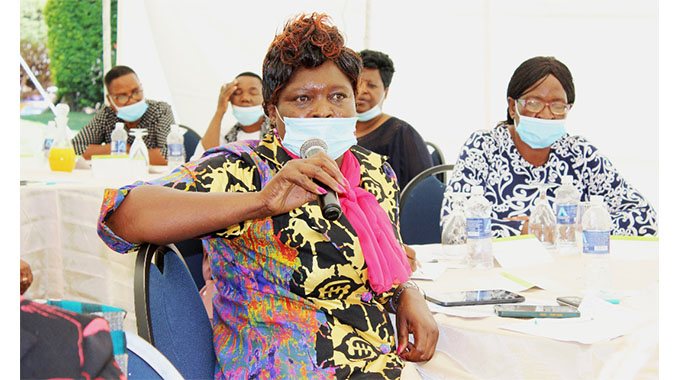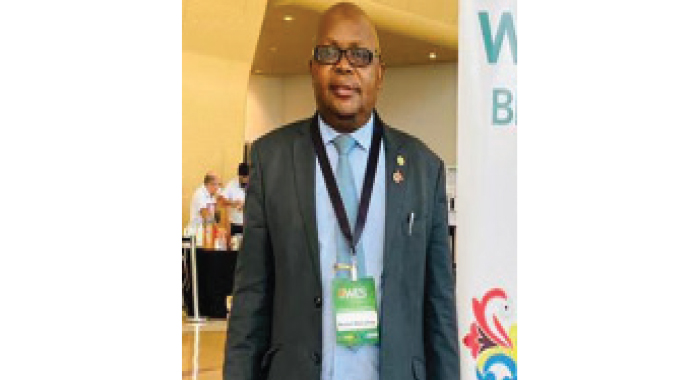From forced marriage to pushing for women political participation : The story of Alderman Dzvinyangoma

Nduduzo Tshuma, Assistant Editor
“When my father said to me ‘enough is enough, you are now able to read and write, you are also ready to be married,’ it was like huge rock dropping from above crushing my head and rest of my body,” recalls Alderman Resta Dzvinyangoma when her father pulled her out of school.
She was a teenager and could not sit for exams as she was deployed to look after her father’s shops while her two brothers continued with school.
Her case was a sad one because the reason behind her dropping out was not poverty in terms of resources but failure by her father to realise that the girl child needed equal opportunities just like the boy child.
“It was so disheartening to me, I’m the first born in my family and also being a girl child, I think a child is a child regardless of sex or gender.
“My mother begged my father to continue paying my fees and he said to her ‘I paid lobola for you, you belong to me so my decision is final.’
“He said enough is enough, the one that he had was for his two sons, my siblings because if he died all his belongings would be inherited by my brothers.”
Now an Alderman in Murewa Rural District Council in Mashonaland where she has been voted as councillor in successive polls since 2004, Ald Dzvinyangoma is inspired by her past misfortunes to push for the rights of the girl child and women.
She is part of advocates that pushed for Amendment Bill No2 that saw a 30 percent quota being set aside for women in local authorities in the 2023 elections.
Ald Dzvinyangoma hopes to use her life story to encourage women to be determined despite hurdles as they push for more equal political participation ahead of the 2023 harmonised polls.
This is against the background of a decline in women’s representation after the 2018 polls with Parliament dropping from 34 percent to 31 percent while the Senate recorded a drop from 48 percent to 44 percent and the National Assembly recorded a decline from 32 percent to 28 percent.
In the Local Government there was a drop from 16 percent to 14 percent translating to 261 female councillors out of 1958 councillors countrywide.
Born in 1974 at Maphisa District Hospital, Matabeleland South, as her mother comes from Chief Bhidi area, Ald Dzvinyangoma grew up in Murewa District, Mashonaland East.
This was after her father, who was employed in Bulawayo at the time, was transferred to South Africa and she was sent to her paternal grandparents in Murewa.
She did her primary school in Murewa and her secondary at Seke 3 High School in Chitungwiza before she was pulled out of school before writing her Ordinary Level examinations.
She then got married to an older man with businesses at Murewa Business Centre.

Alderman Dzvinyangoma at a political parties dialogue on women political participation
“The time I dropped out of school I was encouraged by my aunts to get married to a richer and older man so that I could boost the family’s finances.
That is how I got married to my husband, he had his businesses,” said Ald Dzvinyangoma.
“When I got there, I was given the saloon, I did all the donkey work but I had no control over the finances, I did not even have a bank account, I was just an ordinary woman.”
When she fell pregnant, her husband said he was happy but the sex of the child would determine her future in the union.
“He said ‘yes, I’m happy that you are pregnant but I love boys more than girls so if you don’t give birth to a baby boy, I will marry another woman who will give me a baby boy.’ Fortunately, I gave birth to a baby boy.”
In 1999 when she was pregnant with their third child, her husband directed her to go to rural Murewa to look after the children.
“He said to me ‘you know in our culture, Musha Mukadzi, so you have to go to the village and look after your in-laws.”
Ald Dzvinyangoma, now a mother of two and expecting a third child, found the ruling Zanu-PF conducting a mass recruitment exercise for youths to join the party and she became active in politics.
“I got into various structures starting with the youth wing before I was elected as chairperson in the women’s league and then secretary for administration in the main board,” she recalls.
Ald Dzvinyangoma was also elected as the village secretary working under the traditional leadership. In 2004 she was elected as Ward 1 in the Murewa RDC.
“Our former councillor passed away and a by-election arose. Traditional and political leadership approached me and asked me to stand as a councillor.
I declined saying I was still young and all the councillors I knew at RDC were big men with resources, so they should look for someone else,” she said.
“They then approached my husband and told him that they wanted me to stand for the council position as I was the person with a capacity to lead.
He kept quiet for a while, looked at me and then the delegation, and said ‘its ok, I will talk to her and give you feedback tomorrow.’
“As soon as the delegation left, he said, ‘you know what my friend? this is an opportunity, just try, this is a by-election and its midterm so you will be councillor for two years till the next elections. If you don’t like it then u won’t stand for elections in the next polls”.
With her husband’s blessings, Ald Dzvinyangoma took part in the polls and won and has retained the seat in successive elections until now.
“At the time we did not use the secret ballot at primary elections but there was a system where your backers would stand behind you.
“It wasn’t easy, 12 people,10 men and two women, were interested in the seat. We were reduced to six candidates and I was the only woman left.
The presiding officer tried to discourage me saying I might faint because the game is tough for women,” said Ald Dzvinyangoma.
“I said I would only drop when the people who nominated me say I step down. We went for the elections and I won.
For those five elections that I went through, I was only contested in the first primary election but for the rest I have sailed through without being contested.
“To me, my political party, the men and women have gained confidence in me. You know in politics generally men dominate politics but now, people say ‘we don’t know what you will do if you do not contest.”
Ald Dzvinyangoma managed to sit for her English examinations in 2019 after capacitation by Gender Links, which encouraged her to pursue her education.
She said the treatment she got from her father haunted her for most of her life until she sat for the examination as she always wondered how her life would have turned out had she continued with school.
By virtue of being a Councillor in her ward, Ald Dzvinyangoma is the chairperson of the ward development committee, the gender committee and vice council chairperson of the Murewa RDC and also gender champion in the RDC.
She is also the chairperson of the Mashonaland East Women in Local Government Forum and by that virtue she is the national executive of the Women in Local Government Forum (Rural).
Ald Dzvinyangoma is also the vice chairperson in the Women in Local Government (ZILGA), which combines rural and urban councils.
She is a member of the African Women Leaders Network Zimbabwe Chapter and was recently nominated as a member of the national action plan on the UN resolution 1325.
“Because of those challenges I went through; I am very passionate about women and girls’ rights because most of my rights were abused. Rights to education, marriage, politics, economic emancipation were abused,” she said.
“I don’t want to see another girl going through what I went through so I said to myself, I have to pave a way for gender work to start in me so that I break the bias against women,” said Ald Dzvinyangoma.
“Working with gender links, we have lobbied for the 30 percent quota in local government. This time we are trying to educate people on the 30 percent quota, which is a critical mass that we now have at local government. It’s a new thing, it’s a milestone achievement.
“So, we are giving an education to our communities through their structures so that when the time comes, we don’t miss the candidates for the 30 percent quota.”
Ald Dzvinyangoma says the 30 percent quota for women in local authorities was a start and not an end.
“We also came up with a strategic action plan because you know, yes 30 percent is there but that is not our target.
Our target is to reach the 50/50 representation of women and young women in the political arena.
“We have come up with a strategic plan, with a number of activities, targeted groups and main actors of those activities so that we boost the number from 30 percent using the first past the post system,” she said.
“We are working with different organisations to reach communities so that women participate in the political processes.”
Ald Dzvinyangoma said they were especially targeting women in political parties as there were higher chances of winning when affiliated to political organisations.
She said her experiences taught her resilience as she called for women to open up on issues affecting them.
“What I have also learnt from my experience is to share your plight with others and in the process, you can get a mentor that will give you a shoulder and help you out of your situation until you reach where you want to be,” said Ald Dzvinyangoma.
“In life, education is power, make use of any resources you have at any given time and go to school.”
Alderman Dzvinyangoma has also fought patriarchy within her household.
Her daughter has gone to school up to Advanced Level and is preparing for a course at a tertiary institution.
“When it’s time to go to school, give them equal time. In rural areas the girl child wakes up earlier to do chores yet the boy child wakes up and goes straight to school, which puts the girl at a disadvantage,” she said.
Ald Dzvinyangoma said she is campaigning against a tendency by some families to sacrifice the girl child when children proceed from primary to secondary school.

Alderman Dzvinyangoma
As for her husband, he is happy with Ald Dzvinyangoma’s achievements.
“When we go into offices, I am now more popular than him but the respect I get, he also gets on the grounds that he is my husband.
“Usually, we say men cover everything in the household but with my family it’s now a different scenario, we come from different angles and we combine resources, share ideas and forge together with our lives,” said Ald Dzvinyangoma.








Comments